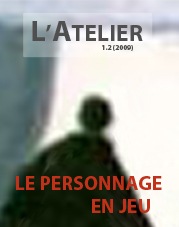(Uncle) Vanya de Howard Barker : le personnage dé-joué
Résumé
(Uncle) Vanya de Howard Barker : le personnage dé-joué
(Uncle) Vanya théorise la notion de personnage selon un double processus de mise à distance : la distanciation spectaculaire entre monde représenté et monde réel y fait l'objet d'une mise en exergue métathéâtrale ; l'intertextualité de la récriture implique une distanciation par rapport à un personnage source et donc la mise en question de la nature même du personnage et des présupposés qui la définissent communément et tendent à confondre personnage et personne. Dans (Uncle) Vanya, la recherche d'une poétique du personnage s'articule à une exploration de sa théâtralité.
Vanya participe du théâtre de la catastrophe barkérien en ce qu'il opère un renversement des idées reçues, subvertit un modèle source pré-existant mais aussi le dialogue dramatique qu'il déjoue dans une démarche qu'on pourrait qualifier de maïeutique.
La notion de personnage serait donc liée chez Barker au concept de vérité, mais moins à sa vérité psychologique (comme personne) qu'à sa vérité discursive (comme « devenir-personnage ») ; aussi se théorise-t-elle comme spécifiquement théâtrale, le théâtre étant le lieu qui parvient à faire coexister le vrai et le faux non comme une contradiction mais comme un artifice, une instabilité tenue, où le discours fonctionne comme une imposture - « you imposter » (331), lance Chekhov à Vanya - permettant de reformuler la question du personnage : non plus comment le dire, mais comment le dé-dire, comment il se dé-dit, non plus comment le nommer, mais comment le dé-nommer, comment il se dé-nomme, entre récriture et désécriture.
(Uncle) Vanya by Howard Barker : the unwritten persona
(Uncle) Vanya re-theorizes the notion of character through two distanciation techniques: first, it highlights the alienation effect which characterizes any form of theatre through various metatheatrical devices; then, as rewriting implies some critical distance from the original Uncle Vanya in Chekhov's play, it questions the very notion of persona and its conventional definition as somewhat similar to "person". In (Uncle) Vanya, the exploration of a poetics of persona is articulated to an exploration of its theatricality.
Vanya partakes to Barker's Theatre of Catastrophe as it subverts its own pre-existing model in Chekhov's Uncle Vanya as well as the dramatic dialogue of Barker's rewriting in a maieutic way.
It then appears that in (Uncle) Vanya the notion of persona is related to the concept of truth - not psychological truth (the persona would then not be distinguished from a person) but discursive truth (the persona, to paraphrase Deleuze, would then be "becoming-persona"). The notion of persona is theorized as specifically theatrical, as theatre is the place where truth and falseness coexist, not as opposites but as artifice, as irresolute yet efficient instability, where discourse is able to function as imposture - "you imposter" (331), Chekhov tells Vanya -, which allows a reformulation of the question of persona: the persona is no longer defined as a character who is spoken, but unspoken, who is no longer defined by a name, but de-nominated in a perpetual tension between rewriting and unwriting.
-
L’envoi spontané d’un article à la rédaction de L’Atelier implique l’autorisation de publication et la cession des droits dans les limites établies par la loi de propriété intellectuelle.
-
L’Atelier conserve les droits de reproduction des articles publiés, quelque soit le support : internet, CD ROM, réimpression, photocopie, etc.
-
L’auteur conserve le droit de publier ultérieurement son article déjà paru dans L’Atelier avec la seule obligation de mentionner le nom de la revue comme source de la première publication.





